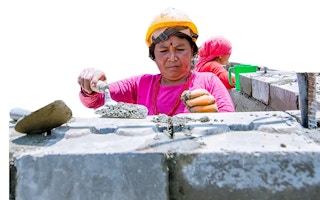Still recovering from the devastating 2015 earthquake and chronic floods, millions of families in Nepal live in difficult conditions. Safe shelter is a privilege that many have yet to enjoy since more than 800,000 homes were destroyed by the disaster.
To continue reading, subscribe to Eco‑Business.
There's something for everyone. We offer a range of subscription plans.
- Access our stories and receive our Insights Weekly newsletter with the free EB Member plan.
- Unlock unlimited access to our content and archive with EB Circle.
- Publish your content with EB Premium.
For rural communities, the effects of forced migration might perpetuate a vicious cycle of poverty and lack of infrastructure in their homelands.
An outflux of Nepali men migrating abroad or to urban areas for work means that the burden of strengthening their native infrastructure has largely fallen upon the shoulders of women.
One such woman is Niruta BK, a mother of three who is now able to not only support herself, but also give employment opportunities to other women around her through being a sustainable construction entrepreneur.
While she personally regrets sending her husband abroad in search of employment, her enterprising spirit has saved other families around her from the same situation.
“
We started the business and the first 2-3 months locals thought we were making toys. It was demotivating and stressful [and] I feared losses. I gathered my strength and continued production.
Niruta BK, sustainable construction entrepreneur, Build up Nepal
Enter Build up Nepal
The social enterprise and winner of the 2020 Sustainable Build Environment (Global) Ashden Award, is empowering rural entrepreneurs to start their own micro-construction enterprises, building resilient, low-cost houses.
These houses, as opposed to traditional fired-brick-cement houses, are built using a simple solution: Interlocking Bricks.
The bricks are made by mixing and compressing soil, sand, and cement, completely eliminating the need for burning or fuel and therefore emitting 35-60 per cent less carbon dioxide emissions.
To date, each enterprise creates 15 low-cost and disaster-resilient houses, 10-12 jobs, and saves 70 tonnes of carbon dioxide emissions per year.
Inclusive construction and green recovery
Founder Björn Söderberg, who was initially despairing of the Covid pandemic and its effect on local people’s livelihoods, was relieved to witness returning migrants seizing the opportunity for a green recovery from the coronavirus.
The number of new construction enterprises Build up Nepal supports every month has since doubled, and prices for the construction of these eco-friendly homes have outcompeted that of regular homes.
Build up Nepal’s work with more than 50 female entrepreneurs is a testament to the social impact of upskilling women, as well as placing faith in rural economies to reduce migration through the creation of green jobs.
Entries are open for Ashden Awards 2021
This year’s award categories include greener communities, energy access, green skills, natural climate solutions, and sustainable cooling.
Harriet Lamb, chief executive of Ashden, said: “This year we are awarding solutions taking on the biggest international climate challenges – from defending our rainforests to helping people survive deadly heatwaves. This includes the ongoing battle to connect everyone with clean and affordable energy, including the world’s 80 million refugees and displaced people.”










